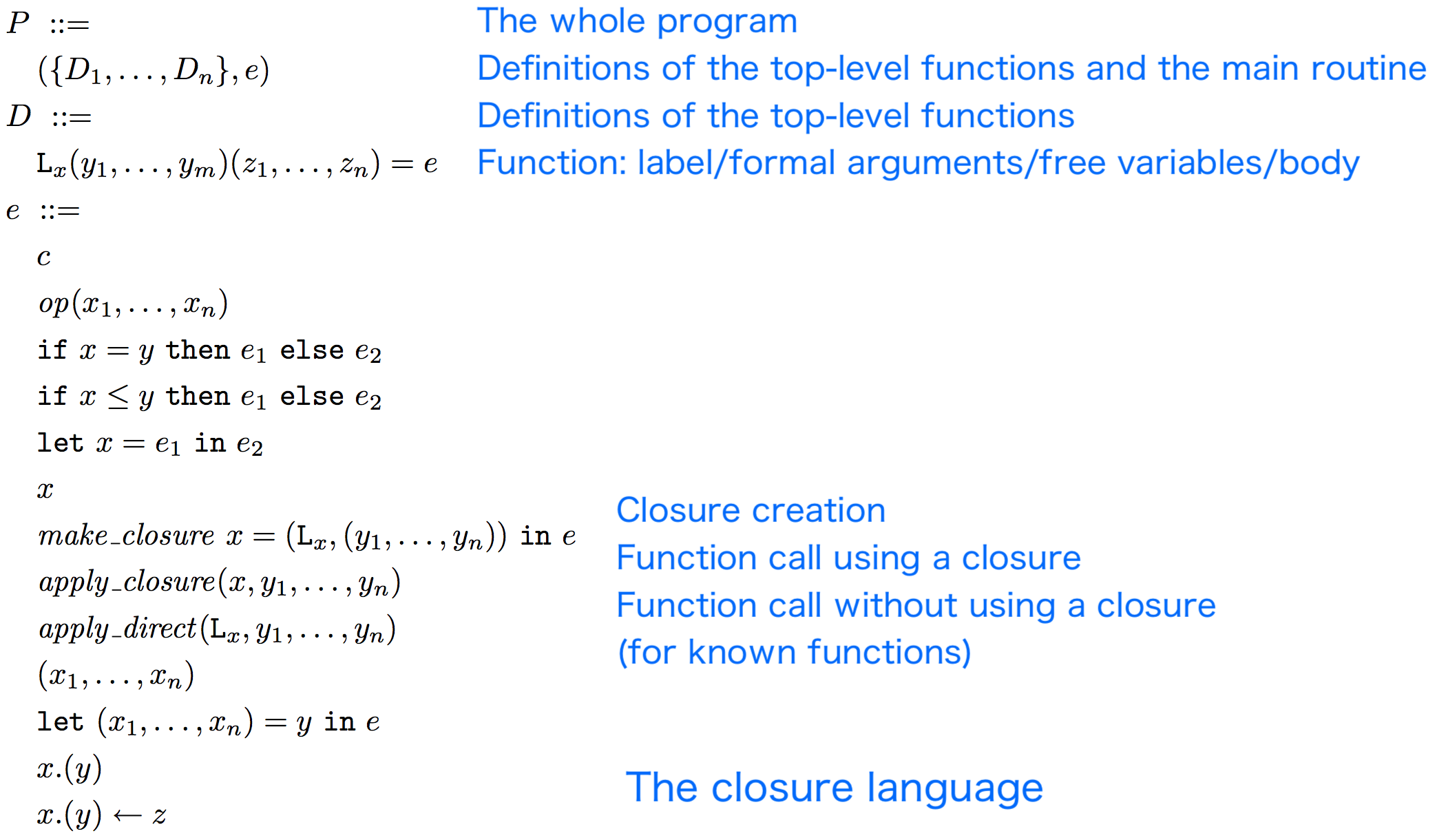Optimization
Ken Wakita (https://wakita.github.io/fp2017/)
Nov. 1, 2017
Overview
Compiler Pipeline
let rec iter n e = (* Iterative optimization *)
if n = 0 then e else
let e' = Elim.f (ConstFold.f (Inline.f (Assoc.f (Beta.f e)))) in
if e = e' then e else
iter (n - 1) e'
let lexbuf outchan l =
...... .......
(..........
(......
(.........
(.........
(iter !limit
(.......
(.........
(........
(.......... ........... .)))))))))Constant Folding
Constant Folding Format
\[\begin {align} {\cal F}&: \text {KNormal.t M.t} \rightarrow \text {KNormal.t} \rightarrow \text {KNormal.t} \\ \varepsilon&: v \mapsto c \\ {\cal F}_\varepsilon(e) &= e' \end {align}\]
Contant Folding Examples
\[\begin {align} {\cal F}_\varepsilon(1 + 2) &\Rightarrow 3 \\ \text {let } x = 5 \text { in } x + x &\Rightarrow 10 \\ {\cal F} \varepsilon(\text {if } x = y \text { then } e_1 \text { else } e_2) &\Rightarrow {\cal F}_\varepsilon(e_1)\quad \varepsilon(x) \equiv \varepsilon(y) \\ \end {align}\]
Simple CF
let constfold_p =
"print(let x = 1 in let y = 2 in if y - 1 = x then x + y else y)"# constfold constfold_p;;
Let (Ti11.12,
Let (x.13, 1, Let (y.14, 2,
Let (Ti10.15, Let (Ti9.16, 1, 1),
IfEq (Ti10.15, x.13, 3, 2)))), ...)Let-Assoc + CF
# ConstFold.f (assoc constfold_p);;
Let (x.45, 1,
Let (y.46, 2,
Let (Ti41.48, 1,
Let (Ti42.47, 1,
Let (Ti43.44, 3, ...)))))The Essense of Constant Folding
\[\begin {align} {\cal F}_\varepsilon(\text {let } x = e_1 \text { in } e_2) &= \text {let } x = {\cal F}_\varepsilon(e_1) \text { in } {\cal F}_{\varepsilon'}(e_2) \\ & \text {where } \varepsilon' = {\varepsilon, x \mapsto {\cal F}_\varepsilon(e_1)} \\ & \\ {\cal F}_\varepsilon(\mathit {op}(x_1,\ldots,x_n)) &= c \quad \text {if } \mathit {op}(\varepsilon(x_1), \ldots, \varepsilon(x_n)) = c \end {align}\]
Implementation of Constant Folding
Elimination of Redundant Definitions
RDE Format
Elimination
\[\begin {align} \varepsilon &: \text {KNormal.t} \rightarrow \text {KNormal.t} \\ \varepsilon(e) &= e' \\ \end {align}\]
Effect System (Detection of side effects)
\[\begin {align} \mathit {effect} &: \text {KNormal.t} \rightarrow \text {bool} \\ \mathit {effect} &: e \mapsto \text {true/false} \\ \mathit {effect}(1) &= \text {false} \\ \mathit {effect}(\text {println(1)}) &= \text {true} \\ \mathit {effect}(\text {array.(0) <- 0}) &= \text {true} \end {align}\]
RDE Examples (Unused Variable)
\[\begin {align} \varepsilon(\text {let x = 1 in 0}) &\Rightarrow 0 \\ \varepsilon(\text {let x = 1 in x + 1}) &\Rightarrow \text {let x = 1 in x + 1} \end {align}\]
RDE Example (Unused Function)
\[\begin {align} \varepsilon(\text {let rec f x = 1 in 0}) &\Rightarrow 0 \\ \varepsilon(\text {let rec f x = x + 1 in f 0}) &\Rightarrow \text {let f x = x + 1 in f 0} \end {align}\]
RDE Examples (Effects of Effects)
\[\begin {align} \varepsilon(\text {let } x = f() \text { in } 0) &= \ ??? \\ \\ ^*\text {case 1} &: \text {f() = 1} \\ ^*\text {case 2} &: \text {f() = y} \\ \text {case 3} &: \text {f() = array.(0) <- 0} \quad\text {// Assignment}\\ \text {case 4} &: \text {f() = println("Effect!")} \quad\text {// Input-Output}\\ \end {align}\]
A Question
Why the let rec rule in RDE definition says
\[ \mathit {effect}(\text {let rec } x\ y_1\ \ldots\ y_n = e_1 \text { in } e_2) = \mathit {effect}(e_2) \]
but not
\[ \mathit {effect}(\text {let rec } x\ y_1\ \ldots\ y_n = e_1 \text { in } e_2) = \mathit {effect}(e_1) \vee \mathit {effect}(e_2) \]
Implementation of Side Effect Analysis
let rec effect = function (* detection of side effects *)
| Let(_, e1, e2) -> effect e1 || effect e2
| LetRec(_, e)
| LetTuple(_, _, e) -> effect e
| IfEq(_, _, e1, e2) | IfLE(_, _, e1, e2) -> effect e1 || effect e2
| App _ | ExtFunApp _
| Put _ -> true
| _ -> falseNaming constructs (
Let*) have no side effectsConditionals’ side effects are those of their subcomponents
- Function applications have side effects (conservative decision)
ExtFunApp: external function application
Assignments have side effects
Others are free of side effects
Implementation of Redundancy Elimination
For let:
\[\begin {align} \varepsilon(\text {let } &x = e_1 \text { in } e_2) = \\ & \begin {cases} \varepsilon(e_2) & \neg \mathit {effect}(\varepsilon(e_1)) \wedge \neg \mathit {effect}(\varepsilon(e_2))\, \wedge\\ & x \not\in \mathit {free\_variables}(\varepsilon(e_2)) \\ \text {let } x = \varepsilon(e_1) \text { in } \varepsilon(e_2) & \text {Otherwise} \end {cases} \end {align}\]
| Let((x, t), e1, e2) ->
let e1' = f e1 in
let e2' = f e2 in
if effect e1' || S.mem x (fv e2') then Let((x, t), e1', e2') else e2'Question
Is there a case such as the following?:
\[\mathit {free\_variables}(e_2) \not= \mathit {free\_variables}(\varepsilon(e_2))\]
Implementation of Redundancy Elimination
For let rec:
\[\begin {align} \varepsilon(&\text {let rec } x\ y_1\ \ldots\ y_n = e_1 \text { in } e_2) = \\ & \begin {cases} \varepsilon(e_2) & \text {When } x \not\in \mathit {free\_variables}(\varepsilon(e_2)) \\ \text {let rec } x\ y_1\ \ldots\ y_n = \varepsilon(e_1) \text { in } \varepsilon(e_2) & \text {Otherwise} \end {cases} \end {align}\]
| LetRec({ name = (x, t); args = yts; body = e1 }, e2) ->
let e2' = f e2 in
if S.mem x (fv e2') then
LetRec({ name = (x, t); args = yts; body = f e1 }, e2')
else e2'Closure Language
Closure Language

Closure Language vs K-Normal Form
What’s gone
let rec: locally-defined functions
What’s new
Top-level function declarations:
\(D = \{ L_{\text {fib}}(n)() = \text {if n <= 1 then 1 else fib (n - 1) + fib (n - 2)} \}\)
make_closure
What’s different
- Function application \(\rightarrow\) apply_closure and apply_direct
Example
let a = 1 in
let rec incr x = x + a in
incr 5Prog ([{name = (L incr.5, Fun ([Int], Int));
args = [x.6];
formal_fv = [a.4];
body = Add (x.6, a.4)}],
Let (...,
Let (a.4, 1,
MakeCls ((incr.5, Fun ([Int], Int)), {entry = L incr.5; actual_fv = [a.4]},
Let (Ti1.7, 5, AppCls (incr.5, [Ti1.7])))),
...)